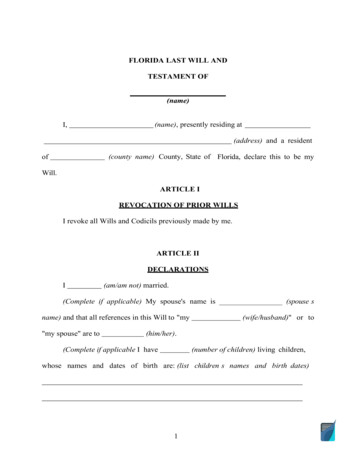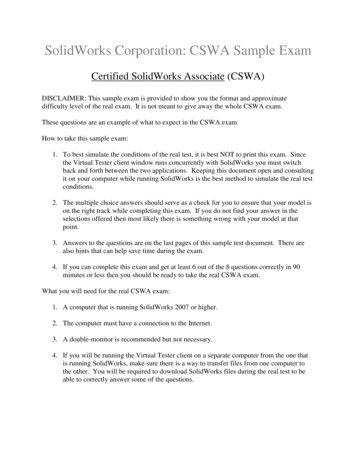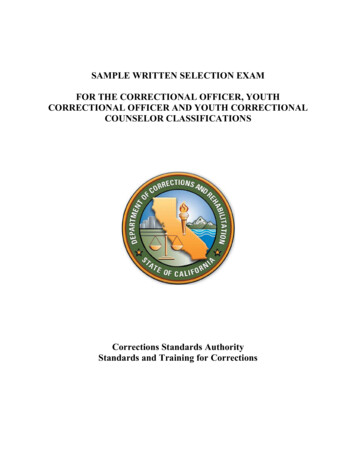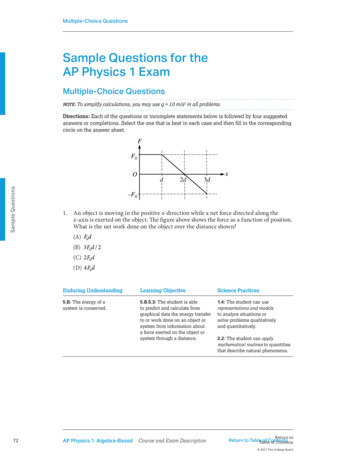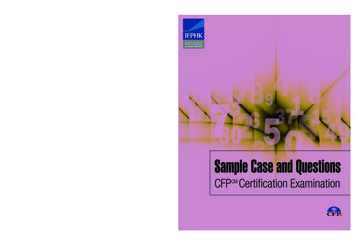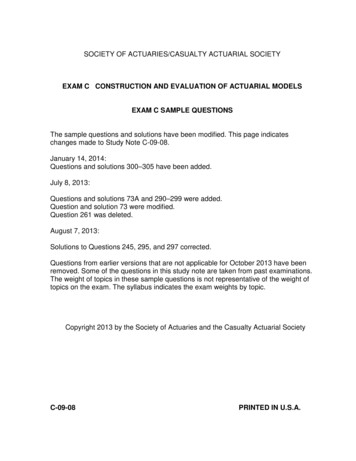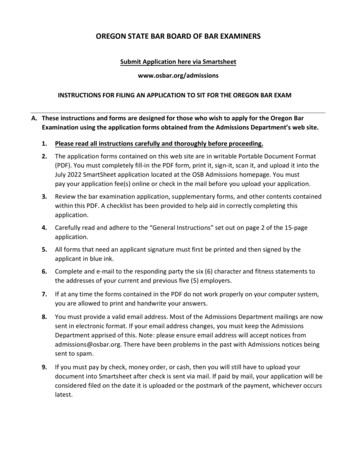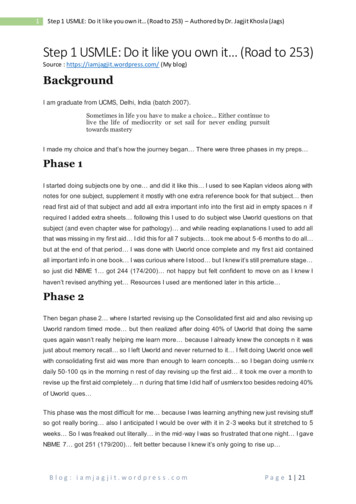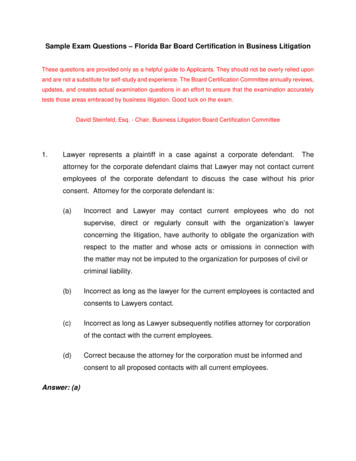
Transcription
Sample Exam Questions – Florida Bar Board Certification in Business LitigationThese questions are provided only as a helpful guide to Applicants. They should not be overly relied uponand are not a substitute for self-study and experience. The Board Certification Committee annually reviews,updates, and creates actual examination questions in an effort to ensure that the examination accuratelytests those areas embraced by business litigation. Good luck on the exam.David Steinfeld, Esq. - Chair, Business Litigation Board Certification Committee1.Lawyer represents a plaintiff in a case against a corporate defendant.Theattorney for the corporate defendant claims that Lawyer may not contact currentemployees of the corporate defendant to discuss the case without his priorconsent. Attorney for the corporate defendant is:(a)Incorrect and Lawyer may contact current employees who do notsupervise, direct or regularly consult with the organization’s lawyerconcerning the litigation, have authority to obligate the organization withrespect to the matter and whose acts or omissions in connection withthe matter may not be imputed to the organization for purposes of civil orcriminal liability.(b)Incorrect as long as the lawyer for the current employees is contacted andconsents to Lawyers contact.(c)Incorrect as long as Lawyer subsequently notifies attorney for corporationof the contact with the current employees.(d)Correct because the attorney for the corporation must be informed andconsent to all proposed contacts with all current employees.Answer: (a)
2.Plaintiff, a Florida corporation, sues Defendant, a National Banking Association,with its principal place of business outside of Florida seeking damages of 1Million. Defendant is served on December 1 and filed its Notice of Removal withthe Federal Court on December 20. Defendant must:(a)Answer or present other defenses or objections within 30 days ofDecember 1.(b)Answer or present other defenses or objections within 30 days ofDecember 20.(c)Answer or present other defenses or objections within 5 days ofDecember 20.(d)Answer or present other defenses or objections within 7 days ofDecember 20.Answer: (d)
3.Peter Fenno, the first floor tenant under a commercial lease brought an actionagainst Donna Solomon, the occupant of the second floor of the building to recoverfor damage to Peter’s property by fire allegedly caused by negligent use of anacetylene torch by Donna’s employees. At trial, instead of offering into evidencevoluminous business records showing the amount of damages suffered, Peterintroduced into evidence a summary showing tabulations of damaged goods forthe purpose of establishing damages. Donna objected, arguing it was error toallow such a summary instead of requiring the introduction of the business recordsfrom which such summary/tabulations were prepared since Peter did not notifyDonna that he would be using a summary. The trial judge should:(a)Sustain the objection because under the “Best Evidence Rule,” the originaldocuments showing the damages sustained by Peter must be introducedinto evidence.(b)Sustain the objection because Peter did not give timely written notice ofhis intention to use the summary and file proof of the notice with the court.(c)Overrule the objection because when it is not convenient to examine incourt the contents of voluminous writings, recordings, or photographs, aparty may present them in the form of a chart, summary or calculation.(d)Sustain the objection because without the raw data on which thetabulations are based the tabulations are inadmissible hearsay.Answer: (b)
4.Orange County Builders, Inc. (“OCB”) defaulted on a loan from National Bank, andworkout negotiations failed. Mike Freed, the sole stockholder of OCB, individuallysued National Bank on various causes of action, including breach of fiduciary duty,fraud and negligent misrepresentation in conjunction with the failed workoutnegotiations.National Bank defended on the grounds that the original loanagreement between OCB and National Bank expressly precluded the claims beingasserted by Mr. Freed and that any representations were made to Mr. Freed in hisrepresentative capacity as an officer of OCB.Mr. Freed asserted that theagreement was only binding on OCB and not on him individually as OCB’srepresentative.At trial, National Bank attempts to impeach Mr. Freed with letters that he hadwritten in an effort to show that Mr. Freed represented himself to National Bank asthe representative of OCB; described himself in the letters as “me, the borrower,”and indicated a willingness to “turn over the keys” to OCB if a workout negotiationagreement was not reached. Mr. Freed’s attorney, Gregg Weiss, has objected tointroduction of the letters on the grounds that they were settlementcommunications and contain hearsay statements. The trial court should:(a)Sustain the objection as inadmissible hearsay.(b)Sustain the objection as statements made as part of settlementnegotiations.(c)Overrule the objection because the letters are not offered on the issues ofliability or the absence of liability or the value of the claim, but rather toprove Mr. Freed was acting in his capacity on behalf of OCB.(d)Overrule the objection because it is a claim involving fraud ornegligent misrepresentation.Answer: (c)
5.The Huey-Long-Bowden Corporation (“HLB”) sued XYZ, LLC for tortiousinterference with a business relationship to recover damages allegedly suffered asa result of XYZ’s filing a lawsuit that disrupted HLB’s efforts to purchase 27 acresof unimproved land in Bumbleweed, Florida. During the course of litigation filed byHLB, HLB’s president (John DeFame) testified at his deposition that XYZ is adeadbeat and never pays its bills and owes ABC 75,000. In the HLB v. XYZlitigation, XYZ moved for judgment on the pleadings based on the litigationprivilege challenge to a tortuous interference with a business relationship claim.The trial judge should:(a)Deny the motion because the immunity afforded by the litigation privilegedoes not apply to intentional torts.(b)Deny the motion because there are genuine issues of material fact as to thenature of the allegedly defamatory statements and the actions of XYZ thatallegedly constituted the interference.(c)Grant the motion because absolute immunity must be afforded to any actoccurring during the course of a judicial proceeding, regardless of whetherthe act involves a defamatory statement, so long as the alleged misconducthas some relation to the proceeding.(d)Answer: (c)Grant the motion because HLB really is a deadbeat who never pays its bills.
6.Which of the following factors is not to be considered by the Court in determiningwhether the use of a copyrighted work is a "fair use" under federal law?(a)The nature of the copyrighted work.(b)Whether the copyrighted work is the creation of a public figure.(c)The amount and substantiality of the portion used in relation to thecopyrighted work as a whole.(d)The effect of the use upon the potential market for or the value of thecopyrighted work.Answer: (b)7.A person admitted as a partner to an existing general partnership:(a)Is personally liable for partnership obligations regardless whether they wereincurred before the person's admission.(b)Is personally liable for that percentage of partnership obligations incurredbefore the person's admission which equates with her percentage capitalcontribution to the partnership.(c)Is not personally liable for any partnership obligations incurred before theperson's admission.(d)Is not personally liable for any partnership obligations incurred before theperson's admission unless it can be shown that she was aware of theobligations at the time that they were incurred.Answer: (c)
8.Bill Lauper is a minority shareholder in Steinfeld Hotels Corporation (''theCorporation''). Darren is the president, sole director, chief executive and majorityshareholder of the Corporation. The Corporation is the sole general partner ofFancy Hotels, Ltd., a Florida limited partnership. Bill owns 25% of the shares ofthe Corporation. Darren owns 70%, and a third shareholder owns 5%. The threeshareholders executed a shareholder agreement. All three shareholders work fulltime for the Corporation.Bill sues Darren claiming that Darren violated theshareholder agreement and breached his fiduciary duty to the Corporation. Darrenfiles a motion to dismiss the case. How should the Court rule?(a)Dismiss the case because the existence or performance of a shareholderagreement cannot be a ground for imposing personal liability on anyshareholder for the acts of the corporation.(b)Deny the motion to dismiss because a shareholder may sue anothershareholder for breach of the shareholder's agreement.(c)Dismiss the case because as the majority shareholder, Darren could takeany acts on behalf of the Corporation that he deemed reasonably prudent.(d)Answer: (b)Deny the motion to dismiss because of the economic loss rule.
9.On April 5, 2015, Hank Jackson rented equipment under a four-year lease. OnJanuary 8, 2016, he was petitioned involuntarily into bankruptcy under Chapter 11of the Bankruptcy Code. Jeremy Slusher is appointed as trustee. The fair marketvalue for the equipment slightly exceeds the balance of the lease payments due.The trustee:(a)May not reject the equipment lease because the fair market value of theequipment exceeds the balance of the lease payments due.(b)Must assume the equipment lease because its term exceeds one year.(c)May elect not to assume the equipment lease.(d)Must assume and subsequently assign the equipment.Answer: (c)10.Discount Finance Corporation purchased retail installment contracts from SharpDeals, a Florida motor vehicle dealer. The retail paper purchased from SharpDeals grants a purchase money security interest in the motor vehicles to thedealer. All of the retail installment contracts with the consumer-purchasers providethat they will be assigned to Discount, as the assignee. The motor vehiclecertificates of title are noted with the lien in favor of Discount. The retail installmentcontracts further provide that the consumer- purchaser of the vehicle waives andagrees not to assert any defense or counterclaim as against the assignee.With respect to any dispute arising between Discount, as assignee of the retailinstallment contracts, and a consumer-purchaser of a motor vehicle from SharpDeals, which of the following statements are true?(a)Under certain circumstances, the purchaser may assert any defensesagainst the assignee that the purchaser may have had against Sharp Deals,despite the inclusion of the waiver of defense clause in the retail installmentcontract.
(b)Under no circumstances may the purchaser assert any defense against theassignee that the purchaser may have had against Sharp Deals, becauseof the waiver of defense clause included in the retail installment contract.(c)Under no circumstances may the purchaser assert any defenses againstthe assignee that the purchaser may have had against Sharp Deals,provided the assignee and Sharp Deals are “closely connected.”(d)None of the above.Answer; (a)SAMPLE BUSINESS LITIGATION SKILLS ESSAYBill Blue and Gail Green each own a 50% percent interest in Walls-R-Us, LLC, thatmanufactures and sells wallpaper. Both are Florida residents, in Blohard County.BillBlue provided the financing; Gail Green ran the company and marketed its product. Abuy-sell agreement contained in the LLC operating agreement enabled either party to buyout the other at any time by offering to purchase the other's interest in the company at aset price. After receiving an offer, the offeree would have thirty days in which to acceptthe offer or elect to purchase the offeror's interest at the same set price. The agreementalso had an enforceable one-year non-solicitation and non-competition clause.Specifically, this provision gave Bill Blue and Gail Green wide latitude to engage inbusiness activities except those similar to the business of Walls-R-Us, LLC, that is, a"competing" wallpaper company.Gail Green offered to purchase Bill Blue's interest for 7 million. Bill Blue demanded toknow whether Gail Green would be borrowing the funds from a third party, one Rob Red,whom Bill Blue knew had earlier approached Walls-R-Us, LLC, and expressed an interestin purchasing the company. Rob Red lives in New Mexico, but owns a condominium inFt. Meyers which he visits occasionally. Bill Blue has held a longstanding belief that RobRed is an unscrupulous businessman, and has personal animosity towards him for events
long ago when they coincidentally attended the same university. Also coincidentally,these events involved Gail Green’s sorority sister, to whom Rob Red had been marriedfor a short time after college. Gail Green believes that Bill Blue harbors lingeringjealousies towards Rob Red, and does not want him involved in anything to do with BillBlue’s business affairs.In fact, however, Gail Green and Rob Red had entered into an asset purchase agreementto acquire Walls-R-Us, LLC from Bill Blue that included confidentiality and no discussionswith others provisions specifically designed to prevent Gail Green from disclosing her trueintentions to Bill Blue. Gail Green told Bill Blue that Rob Red was not providing thefunding for the purchase, nor was anyone else providing the money. Bill Blue alsoconfronted Rob Red who represented he had no involvement in Gail Green’s offer topurchase Bill Blue’s interest in Walls-R-Us, LLC.Bill Blue realized he did not have the technical ability to operate Walls-R-Us, LLC withoutGail Green’s assistance. Nor could Bill Blue successfully market Walls-R-Us, LLC’swallpaper products without Gail Green or someone else with her expertise. Therefore, hefelt pressured to sell his interest, and verbally accepted Gail Green's offer, although hewould not have agreed to sell if someone with her expertise or abilities remained at thecompany.At the closing table during the sale of Bill Blue’s interest in Walls-R-Us, LLC to Gail Green,but before the closing documents were signed, Bill Blue became angry and told GailGreen that he would not go forward with the closing unless Gail Green represented, inwriting, that no third party was providing the funds to pay Bill Blue. Gail Green refused todo so, claiming that Bill Blue was bound by the terms of the buy-sell agreement. GailGreen also responded that she had no obligation to disclose the source of the funds andthat Bill Blue was bound by contract to transfer his interest to her unconditionally. BillBlue refused to sell, threw Gail Green out of his office, and successfully hired someoneto replace her. However, business is off by 25% related to Gail Green’s long time workon behalf of the company. Although Bill Blue is optimistic that he can succeed with her
replacement, it could take 3 to 5 years to get back to where they were in terms of salesvolume.Bill Blue, exercising his powers as President, advised Gail Green that he considered herinvolvement in Walls-R-Us., LLC terminated due to her “deceitful” and “despicable”conduct, refusing to continue to authorized payments of salary, distributions and benefits.Gail Green was removed from all bank accounts before she could take any action toprotect her interests. The banks deny any error as Bill Blue was authorized based uponhis corporate status to undertake these changes to the accounts.Bill Blue subsequently learned through Rob Red’s former wife, that Rob Red had indeedprovided the purchase price to Gail Green, and, then intended to acquire the factory'sassets, the real estate owned by a corporation owned by Walls-R-Us, LLC, on which thefactory was located and to hire Gail to run Walls-R-Us, LLC.Bill Blue sued Rob Red in federal court claiming that Rob Red violated state and federalsecurities laws as well as state common law by denying involvement in the transaction.Rob Red has now threatened to bring Gail Green into the lawsuit. Gail Green’s counsel,who negotiated the asset purchase agreement, had not obtained an indemnification andhold harmless from Rob Red related to this transaction. Gail Green is also concernedabout rumblings from Bill Blue that he intends to sue her and “make sure she never hasgainful employment again.” Rob Red had signed a 200,000 per year 3-year employmentcontract with Gail Green to run the company, but now refuses to honor the agreement.You have been hired by Gail Green to evaluate whether she has any claims against BillBlue, how she might pursue those claims, any defenses Bill Blue may have, as well asclaims against her by Bill Blue. You have also been asked to evaluate any evidentiaryconsiderations, the probability of prevailing, and any risks in the event she should notprevail, on any claim that might be brought, against any other person or entity, the risk ofloss, and the ramifications of a loss. You have been asked to formulate your opinions andlegal conclusions in a memorandum so that Gail Green can review your findings with her
parents, and decide how to proceed, based upon your recommendations. An excellentanswer will include an evaluation of claims that might be brought and your evaluation ofwhether they are viable or should be rejected. You may, but are not required to, use anoutline format including your analysis and evaluation following each point.Sample Business Litigation Skills Essay AnswerOverview.First, it is clear that Bill Blue should lose the case against Z. Z may be entitled to fees since thecase by X against Z would have no merit. X’s claims against Z could be found to be frivolous. Yshould prevail in any litigation brought by X. Y's alleged misrepresentation about Z's involvementin the buy-out did not cause X any damages, or caused him to refuse to sell his interest in ABC,LLC. Rather, X refused to sell because he decided it was in X's economic self-interest to do so.X needed Y's skills; yet froze Y out of the business Although X therefore had no economicallyviable option but to sell, with an enforceable contract requiring X to do so, he decided to freeze Yout of the company. Y has many litigation options. Once concern might be enforcement of thenon-competition agreement, against Y on the basis of Z’s activities, but that argument seems tobe somewhat convoluted, although it is difficult to say how a court might react to such an argumentif creatively plead.X might sue Y for fraud alleging that upon the offer to purchase X’s ownership interest, Y deniedthat Z was involved in the transaction. But no damages flow from this claim. X might also sue Yclaiming that Y breached fiduciary duties to X., possibly under the operating agreement andFlorida law. A court could conclude that X “ knew or should have known" at the time he agreedto sell his interest in ABC, LLC, that X was "involved, and was intending to finance Y’s purchaseof X’s interest. Thus this claim against Y would not be meritorious.Y may have a claims against the Banks for changing the bank accounts.Y may also have a claim against her attorney for neglecting to include a defense andindemnification agreement in her agreement with Z., presuming Z would have agreed, whichseems reasonable to presume based upon the facts presented.Y Claims Against XDismissal pending federal suit?Breach of Buy-Sell Agreement.Breach of contract to convey ownership interest in ABC, LLC. Little risk of statute of fraudsargument as the parties appeared at the closing. Damages based upon sale price. Damagesbased upon reduced value of company.Because of freeze out Y can sue for various violations of the Amended Limited Liability CompanyAct.
X’s Defenses to Y’s ClaimsFraud bar to claims.X Claims Against YBreach of fiduciary duty.Breach of Florida Amended Limited Liability Company ActY may have a fiduciary duty under the Amended Limited Liability Company Act and common lawto disclose her negotiations with Z. However, such duties may be trumped by an enforceableoperating agreement. Here the operating agreement contained no provision preventing Y fromobtaining Z's assistance in funding the buyout under the buy-sell provision. The confidentialityagreement does not prevent this type of activity. Indeed, this provision gave Y wide latitude toengage in business activities except those "similar to the business of" ABC, LLC. that is, a"competing" wallpaper company. The provision was broad enough to allow the Y to negotiate withZ for the purpose of obtaining financing to fund her buy-out of X's interest in ABC, LLC. Thisactivity did not "compete" with ABC, LLC; thus, it did not fall within the exception. Any fiduciaryduty of disclosure that Y may have owed X with respect to such a business arrangement waseliminated by the terms of an operating agreement that allowed the business activity whichoccurred. Of course, the argument can be advanced by X that the omission did not change thecommon law fiduciary duties owed by X to Y. Even so, it would be unlikely that X can establishany damages flowing from this alleged breach, as a matter of law.Also, because the Y's proposed buy-out of X's interest would not create a situation where a thirdparty was buying into ABC, LLC and become X's business partner, a clear purpose (to preventoutsiders) of the right of first refusal was not implicated. Therefore, neither a fiduciary duty or theoperating agreement would require Y to disclose to X how she intended to finance her buy-outoffer. Of course, this argument is belied by the fact that X would not have been placed in this“predicament” had Y not relied upon third party financing. Thus X might argue he is being forcedinto a buy out that implicates the implied duty of good faith and fair dealing, which seems to beviolated by the manner in which Y proceeded. Thus X’s best argument may well be that he wasforced to cancel the sale and terminate Y’s employment because of these clandestine activities.Securities Law violation claim against Y (See claims against Z below).Y’s Defenses to X’s ClaimsSee BelowX Suit Against ZX sues Z in federal court.Derivative claims on behalf of ABC, LLC? It is not a seller of a security but has standing on thecommon law claims. (Does X qualify as a seller of a security?)
X may claim Z violated § 10(b) of the Securities Exchange Act of 1934 (the "1934 Act") and Rule10b-5(b) promulgated thereunder. Second, X may claim that Z directly or indirectly controlled theactivities of Y using the confidentiality and no discussions with others provisions as well as thesecret discussions with Y (that must have occurred) and the Asset Purchase Agreement. As such,X may claim that Z was responsible for the Y’s conduct in violation of § 10(b) and Rule 10b-5(b)as a "controlling person" under § 20(a) of the 1934 Act. Specifically, X will claim that Z wasresponsible for Y’s denial of Z’s involvement. Third, X may claim that Y engaged in a scheme,device, and artifice to defraud in violation of § 10(b) and Rule 10b-5(a).X can identify the "scheme" as X’s and Y’s agreement not to disclose their negotiation; use of thebuy-sell provision "to improperly exclude X from participating in the sale of ABC, LLC; andcollaboration to deceive the X into forcing X to sell his interest to Y under circumstances that werenot ordinary course. X can claim that misrepresentations, omissions, and scheme caused X toagree to sell his interests and suffer injury, due to forcing Y out of the business to protect hisinterest in ABC, LLC.X can also sue under Chapter 517, Florida Statutes for violation of the Florida Securities andInvestor Protection Act, alleging that the same conduct that gave rise to the federal claims forrelief rendered Z liable to X under the Florida securities laws. X may also sue Z (and Y) conspiracyto defraud, alleging that Z conspired with the Y to fraudulently X to sell his interest in ABC, LLC.X may also consider a claim for aiding and abetting breach of fiduciary duties, alleging that Y,aided and abetted by Z, breached the fiduciary duty to X to inform him that Z was supporting theenforcement of the buy-sell agreement. X may also consider a claim for tortious interference withbusiness relations," alleging that Z tortiously interfered with the Y’s business relations with X.Z may seek a stay of the federal court case in the event Y sues X in state court, arguing that suchlitigation could settle through issue preclusion some of the factual issues involved in X’s federalcourt claims.Sanctions by Z against X?Z may argue that should sanction X and his attorneys under the PSLRA for filing and prosecutingthe federal securities law claims. The PSLRA requires the district court, upon final adjudicationof the action, to make specific findings regarding compliance by each party and each attorney .with each requirement of Rule 11(b) of the Federal Rules of Civil Procedure as to any complaint,responsive pleading, or dispositive motion."]15 U.S.C. § 78u-4(c)(1). The district court makesthese findings as it normally would do under Rule 11. See Citibank Global Mkts., Inc. v. RodriguezSantana, 573 F.3d 17, 32 (1st Cir.2009) ("[T]he PSLRA . does not alter the standards used tojudge compliance with Rule 11."); Simon DeBartolo Group, L.P. v. Richard E. Jacobs Group, Inc.,186 F.3d 157, 167 (2d Cir.1999) ("The PSLRA thus does not in any way purport to alter thesubstantive standards for finding a violation of Rule 11.").The PSLRA requires the district court to determine whether X's attorneys violated Rule 11(b) bycertifying, "after an inquiry reasonable under the circumstances," that the federal securities lawclaims were "not being presented for any improper purpose," Fed.R.Civ.P. 11(b)(1), were"warranted by existing law or by a non-frivolous argument for [a change in the] law," Fed.R.Civ.P.11(b)(2), and "h[ad] evidentiary support," Fed.R.Civ.P. 11(b)(3).In the case at hand, the district court may find no merit in any of X’s claims. However, even if thecourt found the claims lack merit, the court might decline to impose sanctions because the court
might conclude that the position taken by X and his was not unreasonable or in bad faith. X couldargue that evidence in the record permitted X and his counsel to present reasonable, good faitharguments that X acted as he did based on Z’s (and Y’s) conduct, and that X consequently hadsatisfied the causation and reliance elements of his securities law claims. The Court thereforeshould not determine that X and his counsel lacked a reasonable basis in fact for filing this action,or that X and his counsel knew or should have known that he lacked a reasonable basis in fact.Also the court may find that the claims on the merits were warranted by existing law or by a nonfrivolous argument for the extension, modification, or reversal of existing law or the establishmentof new law.The district court denied the first claim based onClaims Against Banks?Should the banks have changed the bank accounts?Claims Against Y’s Counsel?Is it malpractice to neglect to include a defense and indemnification agreement in Y’s favor in theasset purchase agreement with Z?
Bill Blue and Gail Green each own a 50% percent interest in Walls-R-Us, LLC, that manufactures and sells wallpaper. Both are Florida residents, in Blohard County. Bill Blue provided the financing; Gail Green ran the company and marketed its product. A buy-sell agreement contained in the LLC operating agreement enabled either party to buy
